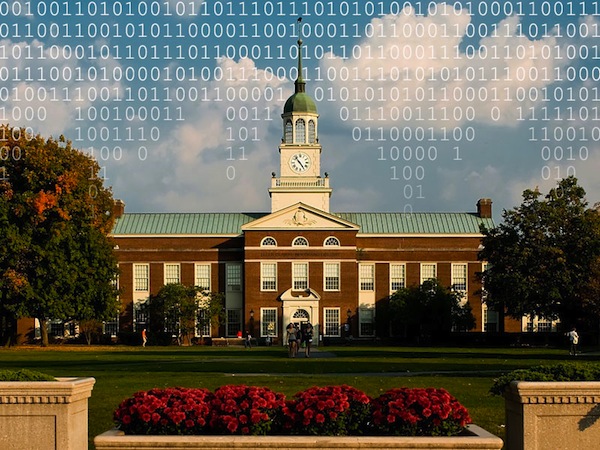Behind the Curtain: The Collaborative Core of Digital Scholarship

In 2017, Bucknell University’s Library and Information Technology celebrates 20 years as a merged organization. In our fall edition of The Next Page, we look at ways that the merger has created opportunities for innovative work. As the head of the Digital Scholarship Program at Bucknell, I took the opportunity to reflect on the range of support and expertise offered by my colleagues across L&IT. While Digital Pedagogy & Scholarship, Research Services, and Special Collections often receive the accolades for the work being done with faculty and staff, there is a tremendous amount of unseen and unsung labor provided by people in other groups. I wanted those colleagues–and the campus–to know that our success is because of them. Our program would not have advanced without the efforts of the entire division. This article only begins to express my gratitude for their intelligence, time, expertise, and generosity.
“Behind the Curtain: The Collaborative Core of Digital Scholarship”
Originally published in The Next Page, Bucknell University, Fall 2017.
If you search for articles discussing “What is digital scholarship?” you will likely find a definition that emphasizes the new modes of teaching, research, and knowledge creation afforded by digital tools and methods. But if you read on in an attempt to find out how institutions support digital scholarship or the advantages of this type of inquiry, you inevitably encounter the word collaboration. This is both a strength and a challenge of digital scholarship: the range of skills, tools, and resources needed to shepherd a project from concept through production necessitates a team effort. To do it well, with an eye toward sustainability and long-term viability of the project, deep understanding and expertise are required. Fortunately, as a merged organization, Library and Information Technology is readily able to collaborate with faculty and students on their digital scholarship projects.
When we say that Library and IT collaborates on digital scholarship projects, we mean the entire division. Discovery and Access Services maintains our institutional repository, secures access to databases and digital resources central to the production of much of our work, and provides deep knowledge of metadata, crucial for creating discoverable and easily accessible digital scholarship projects.
Technology Services manages the imaging on our computers and in our labs to account for specialized software needs for digital scholarship. To do this, they maintain software delivery systems to guarantee that software is readily available, compatible with multiple systems, and is customized for use at Bucknell. They are paramount when exploring new and emerging technologies and partnering on experimental programs, such as our current virtual reality pilot. They also administer and distribute a cache of devices central to the production of digital scholarship, often working with faculty and students in order to accommodate technology needs for classes and research projects.
Systems Integration keeps all of our hosted platforms updated and running smoothly. They provide expert feedback on a range of issues central to digital scholarship projects, including hosting, access, and storage options. Frequently, they come to our rescue when a rogue plugin or user mistake locks a system. Without their knowledge and ability to quickly problem solve, we would not be able to effectively work with faculty on complex projects.
Enterprise Systems audits project databases for stability, security, and interoperability. Often, we turn to the innovative and forward thinking Web Development team to help faculty conceptualize new ways to publish and interact with their research. Their ability to break down projects and explain the components helps us determine viability, and understand and expand our ideas of what is possible. The Business Intelligence group has partnered with faculty, staff, and students to provide training on new modes of data visualization.
Most digital scholarship projects require substantial data transfer and bandwidth. Without the expertise and support of Networking and Telephony, we would not be able to work with and render large data sets, produce complex multimodal projects, synchronously work with faculty and students, or make our projects publicly accessible.
Our Operations and Budgeting team reviews licensing and works with vendors to procure software and hardware necessary for our continued support of digital scholarship projects. They provide critical help in planning for and executing our workshops, events, and summer programs.
While members of Digital Pedagogy and Scholarship, Research Services, and Special Collections/University Archives are often the primary points of contact for faculty developing research projects, we could not provide this high level of support without the commitment and range of expertise from our colleagues across Library and IT.

 orcid.org/0000-0002-8402-9892
orcid.org/0000-0002-8402-9892